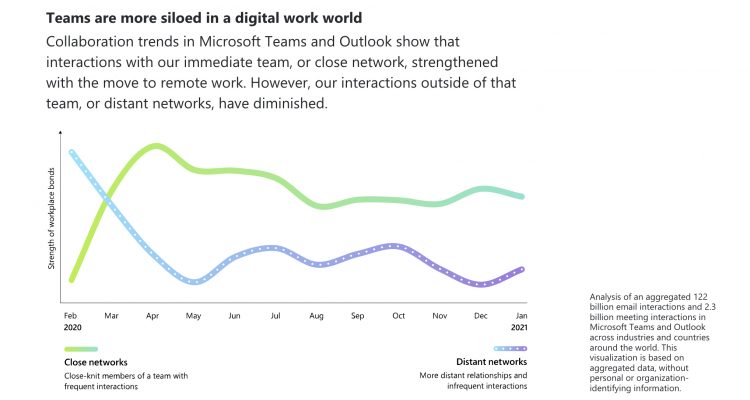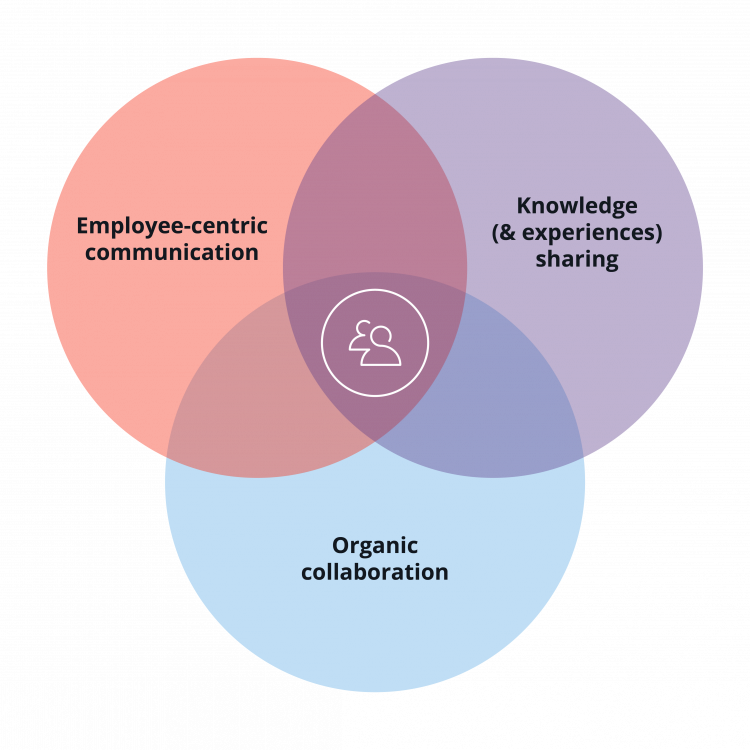Networking and exchanging knowledge in new business contexts: The Value of Business Communities
“Organizations can restart if they are capable of implementing a strategy of courage. (…) An empathic component must emerge and become dominant, companies must be closer to people, to their customers, as well as their employees.”
Rosario Sica – CEO OpenKnowledge
Hybrid management models and “People Centricity”
With the evolution of the pandemic, many transformations within organizations that were already underway in the business context, have experienced a great deal of growth.
The spread of hybrid management models, in which face-to-face work is reduced, if not replaced entirely by remote work, and the logic of collaboration is becoming more widespread and digitized every day, has now also reached many new phases. Until a few years ago, this way of managing resisted a change that is now inevitable.
The workspaces have changed.
The communication tools have changed.
The organization of production times has changed, anchoring itself to new stakes and with new flexibility.
The Microsoft research “The Next Great Disruption Is Hybrid Work – Are We Ready?” was conducted by interviewing more than 30,000 workers in 31 markets around the world between February 2020 and February 2021. The research clearly shows that the move to working remotely has strengthened relationships between colleagues on smaller teams and weakened those in larger circles.

Also, in OpenKnowledge, we monitored the transformations of certain behaviors and relationships within the workspace while in the transition to remote working: find out more in our article that explains Who you sit next to in the office and why it is important
Evidence of this type clearly highlights how the change taking place is not only practical, but also how in the future the ability to design business strategies capable of keeping people engaged with the brand, the team, with each other, will be relevant.
What then becomes necessary is a technological transformation of tools and working methods, to be done simultaneously with a company culture evolution by a collective mentality.
Organic Transformations on All Levels
People Engagement issues are making way within companies. But what does it mean today, in a deeply mobile and ramified organizational context, to put people at the center of everything? It is necessary to start from the professional needs that these people manifest, in the context of their daily working life.
First off, informational needs, such as staying hooked to the “parent company” news, regarding, for example, the launch of a new service or the introduction of new procedural standards are crucial. Then there are the networking needs, from the most basic, like getting in touch with new colleagues or collaborators that are otherwise physically distant or professionally speaking like area of expertise. On the other side, to the most complex needs, like overcoming team or role barriers to enable more agile collaboration flows and participation. Without forgetting the training and growth needs (personal and in a team), its fundamental to bring new knowledge and skills to the worktables starting from the sharing of ideas and experiences.
To meet this type of need, the OpenKnowledge lens is particularly aimed at three organizational dimensions:

A – Employee – Centric Communication
Role and team boundaries are becoming increasingly fluid, breaking down the barriers that often still divide and disrupt the logic of communication. Listening and collaboration between top management and employees is the first step to make an organizational transformation possible.
The more companies are able to structure and feed over time elements like communication flows, active and reactive listening to all their employees, the more the corporate soul solidifies and becomes resilient.
B – Knowledge & experience sharing
Since the start of the pandemic, we have all been geographically more “distant”, yet never before have we had the opportunity to share things so easily, thanks to new digital spaces. We’ve been able to share knowledge, know-hows, experiences, best practices, suggestions and new ideas.
Putting these precious assets together can generate a rich and interactive organizational culture like never before, in adherence to the best standards already present within the company that occurs naturally and is consistent over time.
C – Organic Collaboration
When a constant sharing of information, knowledge, experiences and good practices actually enters the system, collaboration can be clarified and strengthened. Whether between manager and employee, between employee and manager, within the work teams, or different projects, you’ll find the relationship strengthened.
In this way, the organization of work finds a clear and linear structure for everyone. Connections, contacts and exchanges are the foundations of shared and collective cooperation.
To enable the employees to place themselves effectively in the context in which they operate, its necessary to think about three levers. Thinking both in terms of technology and changing of mindset, so that the transformation does not take place only at a purely instrumental level but goes into action with the organizational culture of the group.
The Response of the Business Communities
Business Communities is one of the most effective changes from management projects that goes in this new direction.
In short, we can define Community as any virtual space – lived and partaken entirely online or in hybrid mode – open to a specific group of people with a common interest and used as the main means of communication, expression and exchange. A famous example from the social world is the Duolingo Community, for language learning.
In the organizational field, Business Communities are virtual online spaces – typically hosted by widely shared platforms (eg: Teams, SharePoint or Yammer of the Microsoft 365 suite) or supported by CMS developed ad hoc – where a specific group of employee’s work. Reference to discuss and pursue a common professional goal together is crucial.
Characteristics, layout, structure, contents and logic of interaction vary with this objective and evolve in steps, with the evolution of context, both human and corporate, within the direction every Community moves. In short, each Community has its own story.
Having made this important premise, we can frame, at least by way of example, some of the most widespread macro-types of Business Communities in working contexts:
- Network community – to strengthen existing or develop new networks (e.g. newly formed teams, consolidation of group identities and values)
- Adoption community – to support the introduction of new tools or services (e.g. adoption of a new management software, company-wide introduction of collaboration tools such as Microsoft 365, Google Suite, etc.)
- Community of practice – accompanying the transformation of a specific workflow (e.g. moving to remote working, adaptation of work methodologies to sustainable logics)
- Process community – to enhance a specific operation (e.g. speed up archiving procedures, systematization of quality standards in terms of GDPR)
- Training community – to support the acquisition of new skills and abilities (eg work with the Trainers courses, group literacy on “scrum” and “agile” methodologies)
- Innovation community – to support research and development, or talent scouting logic (e.g., promotion of ambassadorship logic, promotion of new ideas, market benchmarks, internal job posting)
Beyond the choice of type and structure, Business Communities aim to facilitate continuous conversation and exchange cycles in order to enable long-term organizational transformations, acting on both for the practical and cultural spheres.
The positive impact that a Business Community can generate in other distant business areas are exemplified by some of the most recent OpenKnowledge experiences. Examples range from a digital space dedicated to data scientists, designed to enhance the culture of data within a new division corporate, or a Community of engineers and geologists located all over the world with the aim of facilitating knowledge sharing and remote collaborative logics. Another instance, an environment aimed at changing ambassador teams for a population of experts selected from various organizational fields. Through these communities, every day OpenKnowledge connects and animates conversations and knowledge sharing for networks of over 2,000 professionals.
OpenKnowledge’s Key Approach
At OpenKnowledge, we’re open to organizations for the creation and grounding of Business Communities, as a tailor-made support path for each client, structured in various macro-phases of envisioning, co-design, deployment and life-maintenance.
At the center of every project, our guiding principle is always firmly established by listening to people, both the people who design and co-design the digital environment, and then those who then use the service or “inhabit” the Community spaces every day.
It is from the collection of needs, of the sponsors as well as of the recipients, that the design of each Community starts. By listening to the different organizational levels that lies within each Community, that’s when listening and constant attention to the voice and online behavior of its participants that a Business Community can really be successful, returning real productivity and satisfaction benefits to the respected operational business context.
To put it in words of one of our contacts, sponsors and managers of one of the most solid communities that we have helped to design:
“The answers that are coming in are telling us a lot about our new colleagues and their past corporate culture. From these reactions we can imagine what to do to help them favor integration. And this is even more true in a post-pandemic moment: the Community is the best channel to understand what the company’s thermometer is.”
To deepen the scope of Business Communities according to the “OK lens”, we also recommend reading the article “Business Communities – Virtual places of communication and exchange” in “Time regained”, a Harvard Business supplement Italy Review of December 2021 by OpenKnowledge
Authors: Giorgia Stefani, Lorenzo Bruno

 25 February 2022
25 February 2022
